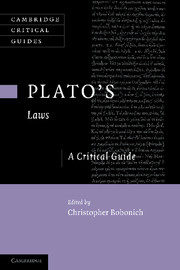Book contents
- Frontmatter
- Contents
- List of contributors
- Introduction
- 1 The Laws' two projects
- 2 The relationship of the Laws to other dialogues: A proposal
- 3 Ordinary virtue from the Phaedo to the Laws
- 4 Virtue and law in Plato
- 5 Morality as law and morality in the Laws
- 6 Puppets on strings: Moral psychology in Laws Books 1 and 2
- 7 Psychology and the inculcation of virtue in Plato's Laws
- 8 Images of irrationality
- 9 Family and the question of women in the Laws
- 10 The theology of the Laws
- 11 Plato's ‘truest tragedy’: Laws Book 7, 817a–d
- Bibliography
- Index
Introduction
Published online by Cambridge University Press: 06 December 2010
- Frontmatter
- Contents
- List of contributors
- Introduction
- 1 The Laws' two projects
- 2 The relationship of the Laws to other dialogues: A proposal
- 3 Ordinary virtue from the Phaedo to the Laws
- 4 Virtue and law in Plato
- 5 Morality as law and morality in the Laws
- 6 Puppets on strings: Moral psychology in Laws Books 1 and 2
- 7 Psychology and the inculcation of virtue in Plato's Laws
- 8 Images of irrationality
- 9 Family and the question of women in the Laws
- 10 The theology of the Laws
- 11 Plato's ‘truest tragedy’: Laws Book 7, 817a–d
- Bibliography
- Index
Summary
It is common to begin an article or a book on Plato's Laws with the lament that the Laws has generally been neglected. Although it remains true that the dialogue has been vastly under-studied, much more has been written on it since the late 1990s or so. This volume is not intended to summarize that literature for the general reader. Instead it offers chapters that are on the cutting edge of current scholarship and that not only contribute to ongoing debates, but also start fresh lines of inquiry.
The Laws is the longest of Plato's dialogues and probably the last (given its length, its composition may have overlapped with that of other late dialogues). Aristotle reports (Politics 2.6) that it is later than the Republic, and there is internal and external evidence that it did not receive its final touches before Plato died. In the Laws, Plato returns to the project of describing the foundation of a just or good city and sketches in considerable detail its constitution, laws, offices, and other social institutions. The dialogue is set on Crete and consists of a conversation in twelve books among an Athenian Visitor (by far and away the main speaker) and his two interlocutors: Megillus, a Spartan, and Kleinias, a Cretan. Their introductory conversation in the first three books is on topics relevant to lawmaking: the proper aim (telos) of legislation, which is the happiness (eudaimonia) and virtue of the citizens; the nature of virtue; some issues in ethical psychology; and the history of constitutions.
- Type
- Chapter
- Information
- Plato's 'Laws'A Critical Guide, pp. 1 - 11Publisher: Cambridge University PressPrint publication year: 2010



